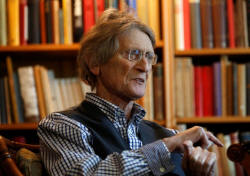 Berlin
festival movie tells true story of Cold War rebels with
a cause Berlin
festival movie tells true story of Cold War rebels with
a cause
 Send a link to a friend
Send a link to a friend
[February 16, 2018]
By Petra Wischgoll and Michelle Martin
ESSEN, Germany/BERLIN
(Reuters) - As Soviet tanks crushed an uprising in
Hungary in 1956, a group of children in East Germany
began their own protest, taking on a communist regime
that would keep their country divided for three more
decades.
|
|
 The true story is told in "The Silent Revolution" ("Das
schweigende Klassenzimmer"), a movie that premieres at the
Berlin International Film Festival that opened this week in the
city that is now the capital of a unified, peaceful Germany. The true story is told in "The Silent Revolution" ("Das
schweigende Klassenzimmer"), a movie that premieres at the
Berlin International Film Festival that opened this week in the
city that is now the capital of a unified, peaceful Germany.
With tightly controlled news media back home, two schoolboys
from the East see footage of the 1956 Hungarian uprising - a key
moment of Cold War history - while on a trip to the cinema in
West Berlin.
They tell their classmates and after listening to western news
on the radio together at a house in the countryside, they agree
to hold a minute's silence for those killed in the failed
revolution.
The entire class is ultimately expelled and most flee to the
West in a bid for freedom and to put their academic careers back
on track.
Dietrich Garstka, who wrote the book on which the movie is
based, started school in 1945 - the year Adolf Hitler's Nazi
regime collapsed - so the communist East German system was all
he knew.

He risked a lot by refusing to answer his history teacher's
questions during the minute's silence, but, Garstka said: "Doing
that protest was important to me, to show these scumbags that we
think differently to them."
He and his classmates realized they would have no chance of
making a life for themselves if branded enemies of the state, so
they decided it was better to take the risk of fleeing.
[to top of second column] |

"They completely underestimated us, thinking we were little puppets
who believed what the 'great socialists' said," he told Reuters.
While Garstka's rebellion was against a system that most Germans now
look on as a grimly repressive regime, he says young people today
remain rebellious and always will.
"I think young people are often underestimated by their parents
nowadays. They're not indifferent ... you can be sure they'll get
involved whenever there's a campaign or something to do," Garstka
said, adding that ecological issues were often the focus of protests
in today's Germany.
"If I wanted to be ironic, I could say we had the luck of growing up
in a dictatorship and we could show that (rebelliousness)."
"The Silent Revolution", directed by Lars Kraume, premieres in
Berlin on Tuesday. The festival runs until Feb. 25.
(Reporting by Petra Wischgoll in Essen and Michelle Martin in
Berlin; Writing by Michelle Martin; Editing by Robin Pomeroy)
[© 2018 Thomson Reuters. All rights
reserved.] Copyright 2018 Reuters. All rights reserved. This material may not be published,
broadcast, rewritten or redistributed.
Thompson Reuters is solely responsible for this content.
 |